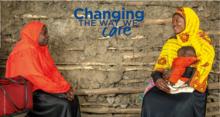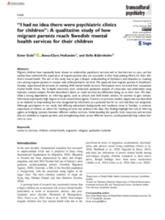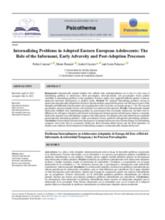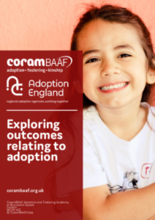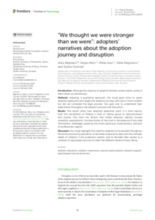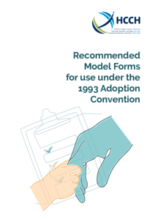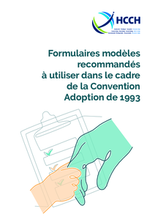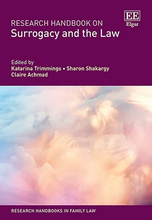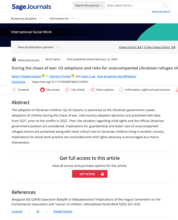Displaying 31 - 40 of 658
This brief provides an overview of Kafaalah, an alternative family care option rooted in Islamic tradition, where a sponsor (Kafiil) cares for a child (Makfuul) without severing the child's ties to their birth family. It explains how Kafaalah differs from adoption by emphasizing that the child retains their birth family name and inheritance rights.
This article aims to trace and present some themes on Sweden's history of transnational adoption, with a particular focus on the public debate and the different narratives that representatives of the adoption triangle—the adoptees, the adoptive parents, and the biological parents—tell when dealing with transnational and transracial adoption as a personal and political phenomenon.
This study focused on internationally adopted children from Russia to Spanish families who suffered early institutionalization. The study found that these children were at risk of a late onset of internalizing problems in adolescence. Both pre-adoption, adversity-related, and post-adoption factors predict variability in internalizing problems in this population.
This Literature Review was commissioned by Adoption England’s Regional Adoption Agency (RAA) Leaders’ Group to support practitioners in care planning for children. This summary document is for use by those directly involved in care planning, and also aims to potentially provide some support for those writing care plans and court reports for children needing permanency away from their family.
Adopting a qualitative approach, this study gave voice to seven adoption applicants in Romania who began the adoption journey with one or more children but did not complete the legal process. The goal of the researchers was to understand their experiences throughout the adoption process and disruption. The present study is part of a larger research project that focused on the resilience of the adoptive family in Romania.
The Model Forms are intended to simplify and facilitate compliance with the 1993 Adoption Convention by assisting Contracting Parties in the collection of relevant information. They contain important information regarding safeguards established by the 1993 Adoption Convention.
Ces Formulaires modèles renferment des informations importantes concernant les garanties établies par la Convention Adoption de 1993, telles que le consentement des personnes, institutions et autorités dans la procédure d'adoption (art.
This essential Research Handbook provides a multifaceted exploration of surrogacy and the law, examining a variety of critical yet under-researched perspectives including globalisation, power, gender, sexual orientation, genetics, human rights and family relations.
This article examines the adoption of Ukrainian children, by U.S. citizens as the Ukrainian government ceases adoptions of children during the chaos of war. Intercountry adoption dynamics are presented with data from 2021, prior to the conflict in 2022.
Amy and Ano are twins, but just after they were born they were taken from their mother and sold to separate families.They found out about each other by chance and as they delved into their past, they realised thousands of babies in Georgia were stolen from hospitals and sold for adoption, some as recently as 2005. Now they want answers.

